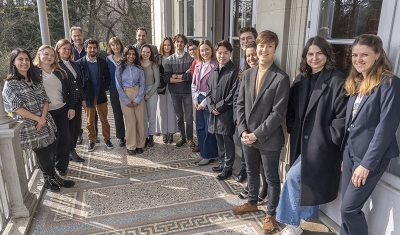Successful Third Edition of the Conference on Current Issues in Armed Conflict
28 June 2019
Co-organized with the Human Rights Centre of the University of Essex, the 3rd edition of the Conference on Current Issues in Armed Conflict (CIAC) successfully took place in Geneva on 17 June 2019. About 75 participants (students, scholars, diplomats, as well as representatives of international organizations and NGOs) discussed contemporary and topical legal issues related to armed conflicts.
The event provided a unique opportunity for discussion, analysis and debate in order to ensure the continued relevance of academia's contribution to the various branches of international law applicable to armed conflicts.
As stated by Professor Clara Sandoval during her introductory remarks, such forums for reflection are crucial in the current global political climate where international law is increasingly perceived as a threat to states' sovereignty.
Investigative Mechanisms and the International Criminal Court
Devoted to the latest developments in international criminal justice, the first panel notably discussed the International Commission of Jurists' proposal for a standing investigative mechanism. In that regard, panelists insisted that all ad hoc investigative mechanisms, such as the ones recently established for Syria and for Myanmar, should be perceived as an end in and of themselves rather than as a mean for ultimately achieving jurisdiction. Based on the principle of complementarity, which should be respected, the primary responsibility for prosecuting of international crimes indeed rests with states.
The panel also addressed the various challenges currently faced by the International Criminal Court, especially following its decision on the situation in Afghanistan. It underlined the questionable way in which the Appeals Chamber is not only shaping its role within the Court but also using inappropriate arguments (the interests of justice, the interests of victims, etc.) in its decisions. One panelist hinted that the trend towards bureaucratisation of the system for international criminal justice was detrimental to its credibility and effectivity.
Social Inequality and Transitional Justice
The second panel of the day focused on social inequality as a matter of transitional justice in the aftermath of armed conflict. Panelists explained that transitional justice should be perceived as a ‘field of operationalization’ allowing for a balance between opportunities, expectations and realistic outcomes, rather than as a static legal framework focusing exclusively on criminal prosecution. They also emphasized the necessity of addressing the roots causes of conflict, rather than its symptoms, through an assessment of the socio, economic and cultural issues relevant to each specific context.

The Classification of Non-International Armed Conflicts
Delving into the technicalities of the classification of non-international armed conflicts, the third panel reflected on the pertinence of the well-known criteria of organization and intensity of violence. In mentioning different conflicts arising in the sub-Saharan region, panelists identified challenges such as the labelling of certain non-state armed groups as ‘terrorist organisations’, the existence of coalitions of such groups, and the increasing difficulty in clearly identifying parties to a conflict. They also insisted that legal determinations – especially those related to classification and thus influencing the applicable legal framework – should remain as practicable as possible.
Conduct of Hostilities
The last panel of the day examined various aspects of the law of conduct of hostilities, beginning with the legality of siege as a method of warfare and the related obligation to let civilians leave. Calling for an ‘unpacking’ of the principles pertaining to the conduct of hostilities, one panelist also focused on the principle of precaution in attack and suggested an analytical sequencing between article 57(1) and article 57(2) of Additional Protocol I to the Geneva Conventions. Panelists finally addressed the real risk of an emerging military confrontation at sea and urged scholars and practitioners to devote more attention to the law of naval warfare.
Black Magic, Zombies and Dragons: a Tale of International Humanitarian Law in the 21st Century
Dr Helen Durham, Director of Law and Policy at the International Committee of the Red Cross, delivered the keynote address that closed the conference.
Inspired by literature, movies and TV series, she notably focused on the power of believing in international humanitarian law as a useful and practicable framework. Just like black magic, it only works if you believe in its power. Dr Durham also warned the audience against the legal and moral risks of dehumanizing the enemy fighters – i.e. individuals qualified as ‘terrorists’ – who, unlike zombies, will certainly not contaminate the rest of the population. She finally emphasized the need to retain human control over new and emerging technologies, for fear of becoming too much like Daenerys Targaryen who used her dragon to massacre an entire city.








